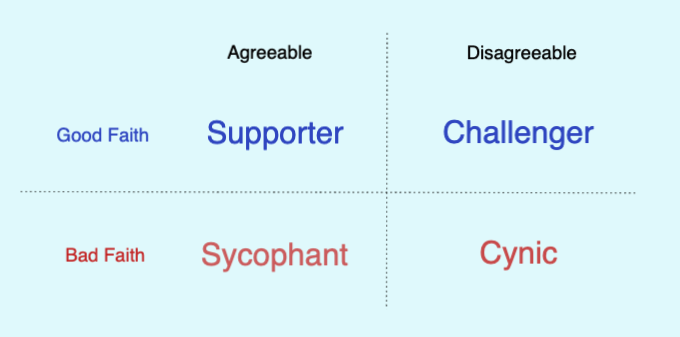 Some groups wear down each other's rough edges; other groups form a gestalt combination of strengths.
Some groups wear down each other's rough edges; other groups form a gestalt combination of strengths.I call these Committee vs Ensemble dynamics.
What sets them apart?
Is one always good and the other always bad?
 possibly offensive thread
possibly offensive thread
Committees are great for "risk reduction": covering blind spots, getting buy-in from stakeholders. But they also risk culling originality and velocity. So upside risk is traded for lower downside risk.
"Lows" preside: Low hanging fruit, Lowest common denominator, Low intensity.
"Lows" preside: Low hanging fruit, Lowest common denominator, Low intensity.
Ensembles are great for creative energy: "yes, and" reinforcement, maximizing unique talents. But they also risk inconsistency, failure/outright bad ideas, and groupthink. So upside and downside risk are higher.
"Highs" preside: High energy, high utilization, high emotions.
"Highs" preside: High energy, high utilization, high emotions.
If it isn't clear: I am trying to be neutral here but I do have a bias. I also recognize that just as you should pick the right tool for the job, you should form the right group for the job.
You don't make Saturday Night Live by Committee. Nor should you make law by Ensemble.
You don't make Saturday Night Live by Committee. Nor should you make law by Ensemble.
How to spot a Committee?
Everyone has a veto. Opinions calcify into checklists. The status quo/path of least resistance is inaction. The group keeps growing because the qualification for membership is "having a stake".
To combat this: Set deadlines, participation requirements.
Everyone has a veto. Opinions calcify into checklists. The status quo/path of least resistance is inaction. The group keeps growing because the qualification for membership is "having a stake".
To combat this: Set deadlines, participation requirements.
How to spot an Ensemble?
(almost) No veto. Everyone is trying to one-up each other in their own way. The status quo is friendly competition or people dropping out because they can't commit. Bad ideas get out into the wild and fail/backfire.
To combat this: Benevolent dictator.
(almost) No veto. Everyone is trying to one-up each other in their own way. The status quo is friendly competition or people dropping out because they can't commit. Bad ideas get out into the wild and fail/backfire.
To combat this: Benevolent dictator.
If I have done my job right I will have pissed off somebody reading this thread. If so, I want to hear it!
I have no room for nuance here but I welcome criticism and hope to incorporate your feedback into an essay I may write in future.
Let's hear your thoughts.
~fin~
I have no room for nuance here but I welcome criticism and hope to incorporate your feedback into an essay I may write in future.
Let's hear your thoughts.
~fin~
enjoyed this convo between @sbkaufman and @AdamMGrant: https://scottbarrykaufman.com/podcast/adam-grant-think-again/
we can't only have unconditional support networks, we also need people who disagree with us in good faith.
Ensembles make good faith easy, Committees must fight to keep bad faith out.
we can't only have unconditional support networks, we also need people who disagree with us in good faith.
Ensembles make good faith easy, Committees must fight to keep bad faith out.

 Read on Twitter
Read on Twitter


